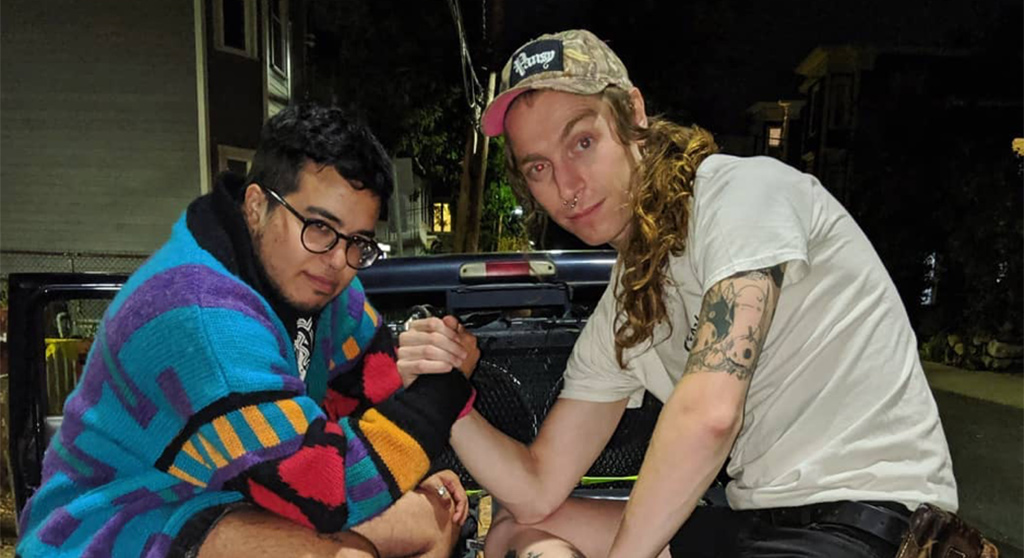Sheer Queer Fest cofounder on value of anger: ‘Some things can’t be fixed by being nice’

Sheer Queer Fest cofounders Manny Raposo and Jamezie Helenski, right. (Photo: Sheer Queer Fest via Instagram)
While Sheer Queer Fest, an annual music festival with Cambridge roots, was canceled for September due to Covid-19, its messaging is still particularly relevant. The fest, first held in 2017, is a DIY space for queer folx to make loud music that defies oppression, in a tradition of using emotionally charged, grassroots efforts to enact societal reform – but with marginalized groups expressing outrage at protests increasingly being painted as violent, it aims to rewrite the narrative.
Long before the revitalized protests sparked by George Floyd’s death by police in May, Sheer Queer Fest argued for anger as a step in the healing process for those who have been systemically wronged. Jamezie Helenski, who cofounded the fest with Manny Raposo, spoke about the ways in which they’re reclaiming anger as a catalyst for change.
This conversation has been edited and condensed for publication.
Sheer Queer Fest centers itself around the voices of angry queer folx. Some may say, “Why so angry?”
SQF was started to provide space for loud and angry queers, because it’s hard to book shows like that up here. With how few DIY basements are left, not many of them are down for a loud, aggressive show, but I saw a need and wanted to do something about it because queers and marginalized folks have plenty to be angry about.

I think anger is an important tool. Some things can’t be fixed by being nice. I think it’s important that we talk about our idea of anger, because I’m tired of hearing that it’s only a negative thing. It takes a lot to allow yourself to be publicly angry. Associating anger with negativity disconnects it from its points of release, like the deep sorrow of understanding the history of oppression, the love you feel for yourself or the folks around you, the hope that something better can be created, and the realization that action can be taken.
In your Facebook post for SQF 2019, you ended your description of the fest with “No cops. No terfs. No boneheads.” Is that just a friendly reminder, or have your festivals attracted negative attention?
I wouldn’t say it’s a friendly reminder. Maybe a playful one, but definitely a “We will throw down, because these queers bash back.” Thankfully, we’ve not had any issues with white supremacists or [trans-exclusionary radical feminists] trying to enter the show. We’ve had the occasional cop try to find out where the benefits are, but other than that we’ve had no major run-ins.

Every year, we have a few of our buffest, most brawny friends volunteer to act as “security” as backup in case things ever do escalate. As much as there are still major issues around queerness and racism in Massachusetts, it helps that we are holding the fest in the Northeast. We benefit from the privilege of carrying this out in a community that is already mostly nonconfrontational.
So we’re nonconfrontational – but there’s also a generalization that the Cambridge area is extremely progressive and socially conscious. Have you found that to be the case?
Since Cambridge is basically the same as Boston, one of the most segregated cities I’ve ever lived in, I would say that generalization is incredibly inaccurate. I think this area brands itself, given its position in the “North,” as somewhat of a progressive safe haven. It is in some aspects, but it only allows the true nature of Cambridge/Boston to become more invisible. I grew up in Texas and Philly, and I keep telling folks up here that at least further South you know who to avoid. Up here, people will smile to your face as they are doing something queerphobic/racist/sexist. I think that realization played a part in wanting to start the fest.
You hold yard sales and GoFundMe campaigns to finance the festival. Why not reach out for outside assistance?
That would change the fest in a way we don’t want. Sure, it’s hard to raise money. The first two years, I had to sink a lot of personal money into the fest for things to run, but queer art and people are already monetized and exploited in ways that piss us off. Keeping it grassroots is essential to the fest because that’s what community is all about. As soon as you involve some sort of corporate or commercial venture, it’s no longer about the people or the music.
We’re tired of the same old stuff being peddled by bands getting away with horrible things. Boston, in particular, gets me fuming about this; as much as we’d like to pat ourselves on the back for how “good” our scene is, there are still terfs in the scene. There are still people who wear swastikas and queer folks trying to skirt accountability for their actions because they know how to play the respectability game or shout the loudest.


